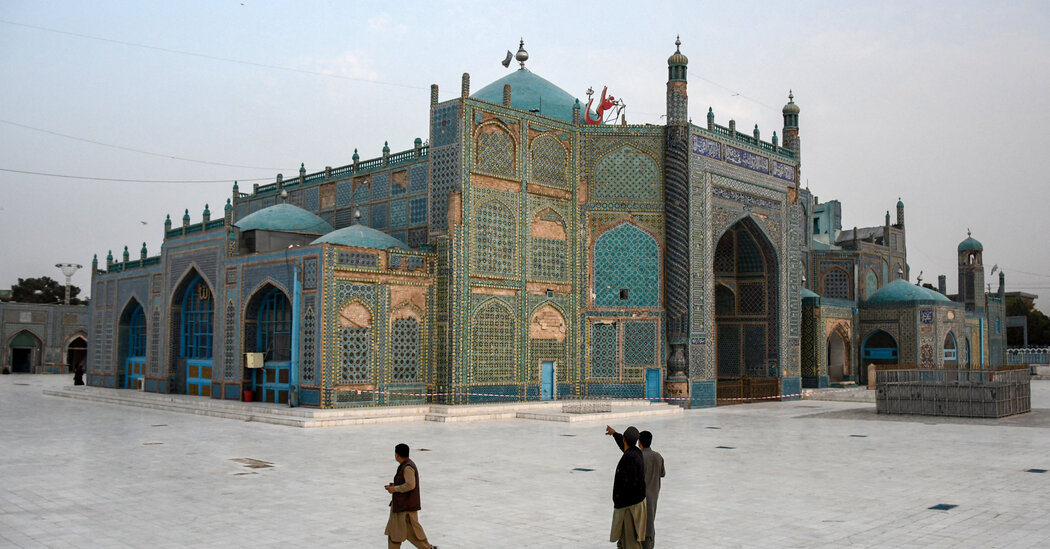The Blue Mosque of Mazar-i-Sharif trembled and teetered in the early hours of Monday when a 6.3-magnitude quake struck northern Afghanistan. It shed countless turquoise, indigo and lapis tiles, and parts of its minarets collapsed. Others are filled with cracks and splits.
Nobody appeared to be injured or killed nearby — the quake struck just before 1 a.m. And yet, the damaged complex has become a symbol of sorts for a bruised nation and the catastrophes it has faced this year.
Before the earthquake struck on Monday, Afghanistan was already reeling from billions of lost aid money, military clashes with neighboring Pakistan and the threat of all-out war, and another deadly earthquake in August.
At least 26 people died in the quake, primarily in Balkh and Samangan provinces, near the border with Uzbekistan; more than 1,100 others were injured, and hundreds of buildings were destroyed, according to the Afghan authorities and the World Health Organization.
Like Afghanistan, the Blue Mosque is still standing. But, like the country, it is increasingly weakened and frail, with hopes of reconstruction dimming by the day.
“The Blue Mosque has the dignity of a mother for us in Mazar, but this mother is becoming poorer day by day,” said Naqib Ahmad Lawang, 25, a shoemaker who has a street stall in front of the mosque.
The Blue Mosque, built in the 15th century, sits in the center of Mazar-i-Sharif, which grew around it. It even gave the city its name, which means “Tomb of the Saint.” The mosque is said to be the burial site of Ali, the son-in-law of the Prophet Muhammad and the first Shia imam.
Already weakened by neglect and lack of repair, according to local worshipers and religious scholars, the mosque appeared to be tottering when New York Times journalists visited it on Tuesday.
The upper section of two minarets had fallen from the shrine, and one appeared on the verge of collapse, sliced by a crack that looked like an open wound. Bricks were falling occasionally, smashing on the white tiled courtyard.
A drizzle dampened the shrine’s courtyard and bathed the complex in a serene gloom , a stark contrast to the scenes of destruction a day earlier. Doves soared overhead as worshipers took photos and videos in silence. They walked barefoot across the cold, rain-washed surface while maintenance workers cleaned the courtyard’s white tiles, but some areas were still littered with debris and out of reach.
Sayed Osman, a construction worker who was visiting his brother, looked at the mosque with an expert eye. He said he feared the mosque would collapse if fallen tiles were not replaced and water seeped into its cracked walls. He said he wished it could be repaired, but added, “The government doesn’t care about this historical site, because some of the damage happened a long time ago, and the government hasn’t fixed it yet.”
Others voiced their frustration not just with the mosque’s damage, but with the rule of the Taliban, who returned to power in 2021, as the United States was withdrawing from Afghanistan.
“They brought security, but people are only safe in a cemetery,” said Mir Agha, a farmer from one of the villages most affected by the quake.
Mr. Agha described the lack of job opportunities and widespread poverty as the main sources of frustration among Afghans. “We cannot tie stones to our stomachs and sleep,” he said.
Abdul Aziz, a taxi driver, was waiting for customers at the Blue Mosque, with no luck. There used to be more visitors to the shrine, he said, including women and children, but the Taliban have banned women from entering.
Mazar-i-Sharif was one of the last cities to fall to the Taliban in 2021. It hosts a large population of Hazaras, a Persian-speaking, Shia Muslim minority that has long been persecuted by Afghan governments, including the current one led by the Taliban, who are predominantly Sunni Pashtuns.
Taliban fighters killed at least 2,000 Hazaras in 1998, according to an estimate by Human Rights Watch, when the Taliban captured Mazar-i-Sharif during their first rule. The killings were in apparent retaliation for the thousands of deaths the Taliban had suffered when attempting to capture the city a year earlier.
No massacre of that scale has been documented since the Taliban returned to power in 2021, but there have been numerous attacks on Shia mosques as well as schools, markets and hospitals in areas predominantly populated by the Hazara minority, most of them carried out by Islamic State militants.
For many Hazaras in Mazar-i-Sharif and beyond, the Blue Mosque had brought a reassuring, albeit increasingly fragile, presence. Mohammad Arif Amiri, a Hazara and Mazar-i-Sharif resident, came on Tuesday to check on the mosque at his father’s request, because both were worried about “what happened to its beauty.”
As Mr. Amiri, 28, wandered around the Blue Mosque, he said, “When I see the damage, it feels like some parts of my own body have been injured.”
Elian Peltier is an international correspondent for The Times, covering Afghanistan and Pakistan.
The post Scars in the Blue Mosque Reveal Afghanistan’s Rifts appeared first on New York Times.




